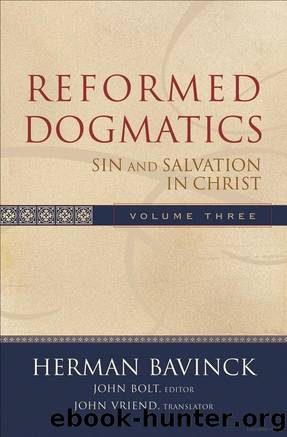Reformed Dogmatics Volume 3: Sin & Salvation in Christ by Herman Bavinck

Author:Herman Bavinck [Bavinck, Herman]
Language: eng
Format: epub
Tags: Reference
ISBN: 9780801026560
Goodreads: 277736
Published: 2014-01-11T00:00:00+00:00
The Sacrifice of Christ
[376] According to the New Testament, all these different testimonies of the law and the prophets culminate in Christ. The whole Old Testament is basically fulfilled in him. In him all the promises of God are yes and amen (Rom. 15:8; 2 Cor. 1:20). He is the true Messiah, the king of Davidâs house (Matt. 2:2; 21:5; 27:11, 37; Luke 1:32; etc.); the prophet who proclaims good news to the poor (Luke 4:17f.); the priest who, according to the Letter to the Hebrews, in his person, office, appointment, sacrifice, and sanctuary far exceeds the priesthood of the Old Testament. He is the Servant of the Lord who as a slave (Î´Î¿Ï Î»Î¿Ï, Phil. 2:7â8) came to serve (Mark 10:45), submitted to the law (Gal. 4:4), fulfilled all righteousness (Matt. 3:15), and was obedient to the death on the cross (Rom. 5:19; Phil. 2:8; Heb. 5:8). As such Jesus made a distinction between the kingdom of God as it was now being founded by him in a spiritual sense and as it would one day be revealed in glory; between his first and his second coming, events that in Old Testament prophecy still coincided; between his work in the state of humiliation and that in the state of exaltation. The Christ had to enter glory through suffering (Luke 24:26).
The work that Christ now accomplishes in the state of humiliation is described in the New Testament from many different angles. It is a work that the Father gave him to do (John 4:34; 5:36; 17:4); generally speaking, it consisted in doing Godâs will (Matt. 26:42; John 4:34; 5:30; 6:38) and specifically included the âexegesisâ of God (John 1:18), the revelation and glorification of his name (17:4, 6, 26), the communication of Godâs words (17:8, 14), and so on. Christ is a prophet, mighty in words and deeds (Luke 24:19); he is not a new legislator but interprets the law (Matt. 5â7; 22:40; Luke 9:23; 10:28; John 13:34; 1 John 2:7â8), proclaims the gospel (Matt. 12:16â21; Luke 4:17â21), and in both preaches himself as the fulfiller of the former and the content of the latter. He is the law and the gospel in his own person. He is not a prophet only by the words he speaks but primarily by what he is. He is the Logos (John 1:1), full of grace and truth (John 1:17â18), anointed without measure with the Spirit (John 3:34), the revelation of the Father (John 14:9; Col. 2:9). The source of his message is himself, not inspiration but incarnation. God did not even speak with him as he did with Moses, face to face, but was in him and spoke through him (Heb. 1:3). He is not one prophet among many, but the supreme, the only prophet. He is the source and center of all prophecy; and all knowledge of God, both in the Old Testament before his incarnation and in the New Testament after his resurrection and ascension, is from him (1 Pet. 1:11; 3:19; Matt.
Download
This site does not store any files on its server. We only index and link to content provided by other sites. Please contact the content providers to delete copyright contents if any and email us, we'll remove relevant links or contents immediately.
Signature in the Cell: DNA and the Evidence for Intelligent Design by Stephen C. Meyer(2855)
Real Sex by Lauren F. Winner(2832)
The Holy Spirit by Billy Graham(2745)
The Secret Power of Speaking God's Word by Joyce Meyer(2704)
The Gnostic Gospels by Pagels Elaine(2372)
Jesus by Paul Johnson(2201)
Devil, The by Almond Philip C(2181)
23:27 by H. L. Roberts(2132)
The Nativity by Geza Vermes(2098)
Chosen by God by R. C. Sproul(2034)
All Things New by John Eldredge(2033)
Angels of God: The Bible, the Church and the Heavenly Hosts by Mike Aquilina(1860)
Angels by Billy Graham(1832)
The Return of the Gods by Erich von Daniken(1812)
Knowing God by J.I. Packer(1713)
Jesus of Nazareth by Joseph Ratzinger(1688)
Evidence of the Afterlife by Jeffrey Long(1687)
The Gnostic Gospel of St. Thomas by Tau Malachi(1653)
How To Be Born Again by Billy Graham(1650)
